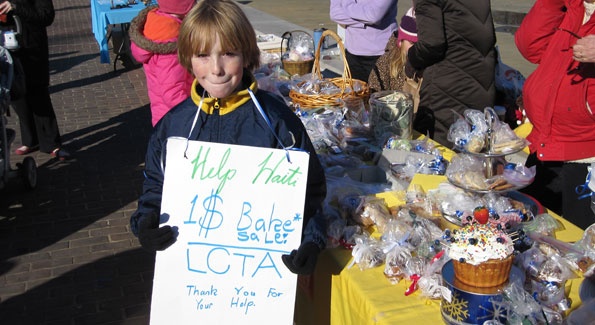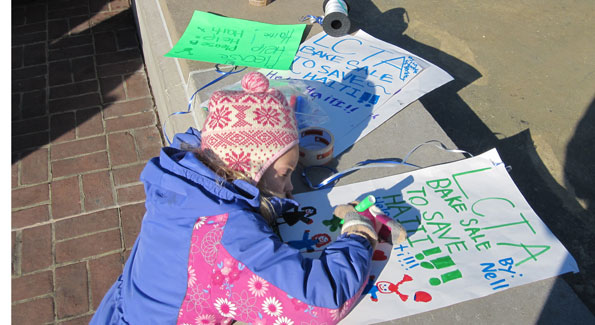Experts weigh in on easy ways to get kids in the habit of giving at an early age.
By Jane Hess Collins

Ben, a student at Lyles-Crouch Traditional Academy, helped raise over $1,500 for Haiti in Old Town Alexandria’s Farmers’ Market. (Photo by Jane Hess Collins)
It’s a challenge to raise kids. And while it may seem like more of a challenge to raise kids to be generous, it’s really a matter of introducing or changing a few habits. The tips below, while not all-inclusive, can start those good habits to create the next generation’s givers.
Start early. Colleen O’Donnell, author of Generous Kids, recommends that children start learning to give as early as age three. “When we teach them the habit of giving early, it becomes part of who they are,” O’Donnell explained. She pointed out that we don’t wait until our kids are seven years old to teach them to brush their teeth. Why would the habit of giving be any different?
Ask questions. The questions you ask your kids can inspire them to think about the value and importance of being kind and generous to others. Gail Perry Johnston, author of The Social Cause Diet, recommends asking kids specific, open-ended questions (“What did you do at recess?” rather than “How was school today?”) or having the whole family, including mom and dad, name the “high” and “low” part of the day at dinnertime. Johnston also recommended reading the children’s book Have You Filled a Bucket Today?, a book that that imagines that we all have an invisible bucket to fill or empty based on what we do for others. That gives the parents the chance to ask their children, “Have you filled a bucket today?”
Praise your child’s giving habits. “Giving is something as simple as helping to set the table,” said O’Donnell. Praise your child when he helps around the house, or shares a toy, or even listens to a friend. “Listening is giving,” she added.
Make giving a family affair. The trick is to get your kids involved, engaged and excited, said Dr. Madye Henson, President and CEO of Greater of DC Cares. Decide as a family where you will get involved and what you will do. Involve your kids in the planning and research. Find out who your family will help and the difference your volunteer time will make. Kids want to make a difference but need to know why. “Once you can answer the ‘why,’ many [kids] jump on board,” Henson advised.
Talk about it afterward. What did your kids enjoy about the volunteer experience?
What didn’t they like? Would they want to do it again, or what new project would they like to do? How did the experience make them feel?
Besides clueing the parents in on how their kids liked the project, it also gives parents the chance to “fill in the blanks,” said Henson. The discussion, she explained, lets parents “educate and actually enlarge their understanding of what just happened, what they did, who they actually impacted and why it might be important to continue to do something to help support that.”
Let your children see the results of their giving. “The results are an important part in volunteering because people want to know they made a difference,” Henson noted. If your family plants flowers in a local park, make sure your kids see the flowers in full bloom.
If they help with a Habitat for Humanity project, show them the completed home and the joy of the family who moves into it. Take your kids with you when you donate clothes and household items and encourage them to talk with the people they meet there.
Or, help your kids find a local charity they can volunteer with or donate to. Take them to the animal shelter where they see how their time or money helped the kitties and puppies. Bring your kids to the library if they donated or bought books, so they can see the books on the shelves.
“If kids’ hearts can be touched it is a more powerful experience,” O’Donnell emphasized.
Live the example. Ultimately, your own example is your best bet in raising generous kids. They model what you do, as well as your attitude. Even the little things count. O’Donnell believes that even when you let someone cut in front of you in traffic or a grocery or traffic line counts as an example of generosity.
“The habit of giving can change generations,” she said.





